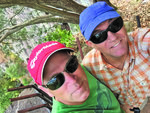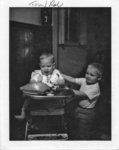

Tom Savage and his brother, Bert, have enjoyed a close relationship ever since they were little boys.
As two middle children in a large Irish Catholic family of seven siblings, the brothers even shared a bedroom growing up – so nothing would mean more to Tom now than being able to share the gift of life with his brother as a living kidney donor.
But he can’t.
Tom, a 54-year-old Buckingham Township resident, is not a match for Bert – who is currently one of more than 100,000 people waiting for a kidney transplant, according to the National Kidney Registry (NKR), a nonprofit organization that works with a network of 97 member centers to facilitate living donor transplants. Bert, a 56-year-old husband, father of two and lawyer from Tierra Verde, Fla., has been waiting for a kidney transplant since late 2019, currently requiring at-home dialysis – which he administers himself – five days a week, three hours per session, less than two years after learning his kidney was failing for the second time in his life.
For Bert, the first signs of trouble emerged in high school, when a test showed he had protein in his urine. A nephrologist said he must’ve had a bad upper respiratory infection and “an opportunistic bug got in,” Bert recalled. “The doctor said it could be nothing or someday I might need a kidney transplant.”
Several years later, the toll of training for the Chicago Marathon caused the bug to attack his kidneys and in 1992 Bert underwent his first kidney transplant. The kidney was donated by his cousin, Peter Savage.
But in 2019, “after 27 years of taking the rejection medicines, which ironically are toxic to kidneys, the transplant was damaged,” Bert explained. “I noticed edema in my legs, so I had some tests done and my kidney function had decreased.”
This time around, however, no one in his family is a match, and without a living donor Bert could be waiting several more years for a kidney. According to the National Kidney Foundation, kidney transplant candidates wait, on average, three to five years for a kidney from the national deceased donor waiting list.
Since Tom can’t donate one of his own kidneys to his brother, he’s doing the next best thing by giving the gift of life to someone else through the NKR, which helps people facing kidney failure by facilitating paired kidney exchanges.
In paired exchanges, there is a donor who is willing to donate a kidney on a patient’s behalf, but is incompatible with the patient or wants to try to find a better match, the NKR website explains. “With kidney paired exchange, your donor will donate their kidney to another recipient in exchange for a compatible kidney for you.”
In such a scenario, Tom’s kidney “could go to the person in the next operating room, or it might go to somebody in upstate New York or California,” he explained. “That’s the complexity of why you need a robust foundation like the NKR that can make that all happen.”
Matches can also involve multiple pairs of donors and kidney transplant candidates in what is known as a paired exchange chain. Individuals who simply want to help a stranger waiting for a kidney are also encouraged to become living kidney donors.
NKR member centers in the Philadelphia region include Temple University Hospital, Thomas Jefferson University Hospital and University of Pennsylvania Hospital, where Tom gets his testing done and where his surgery would take place; Bert would undergo his surgery at Tampa General Hospital.
Join our readers whose generous donations are making it possible for you to read our news coverage. Help keep local journalism alive and our community strong. Donate today.